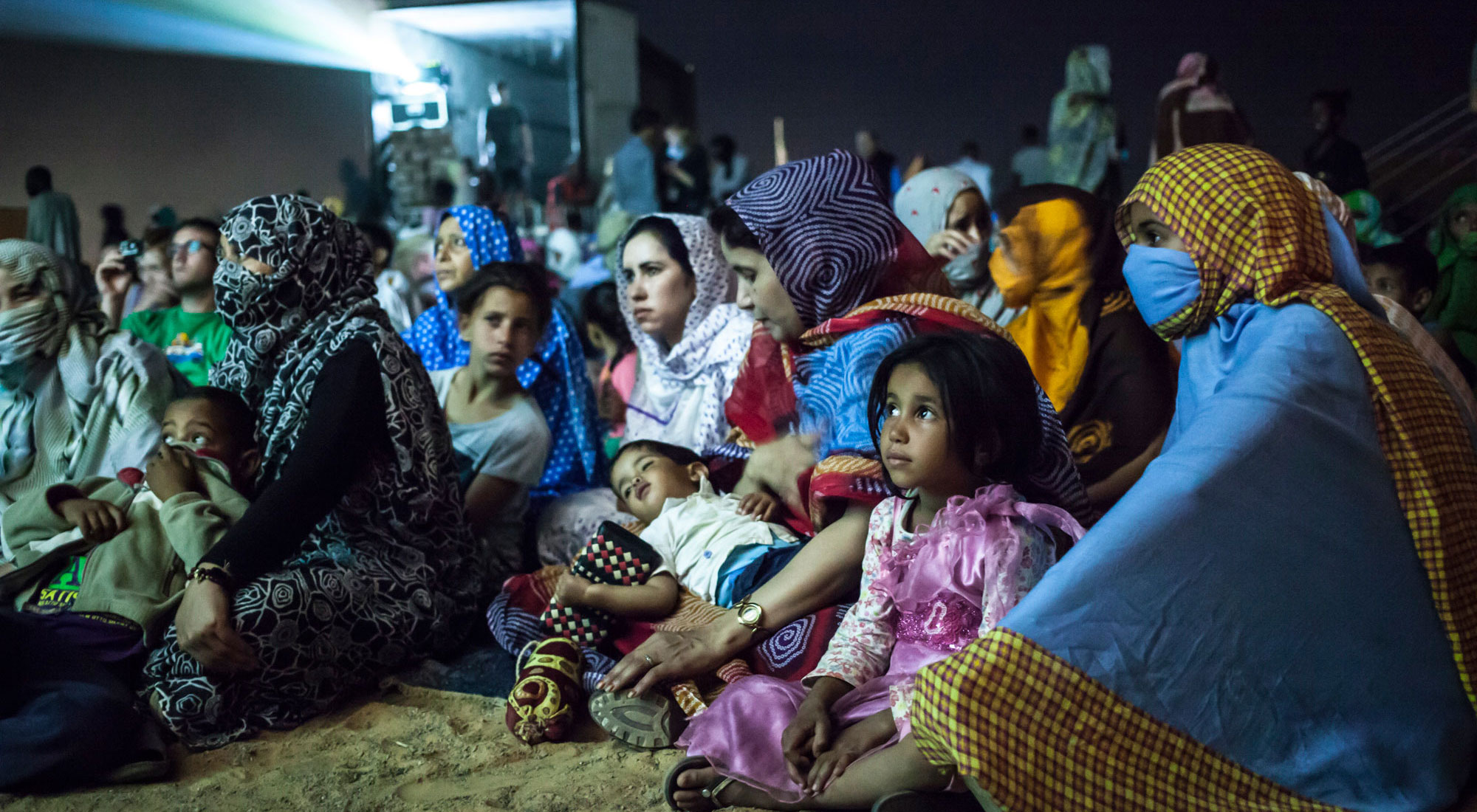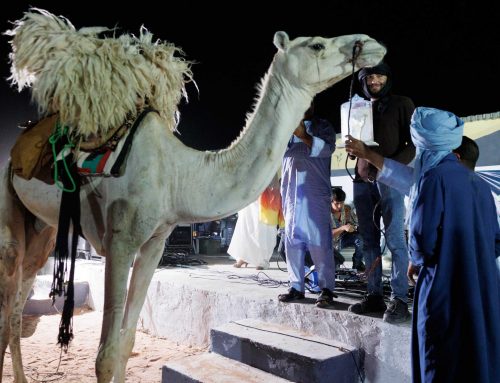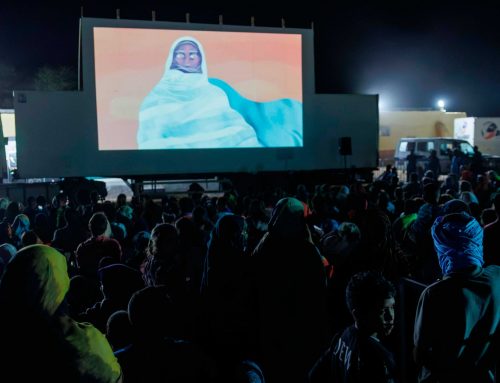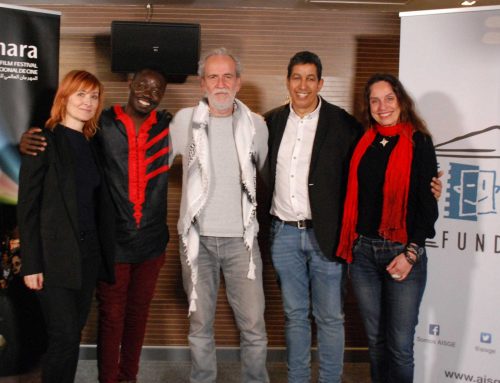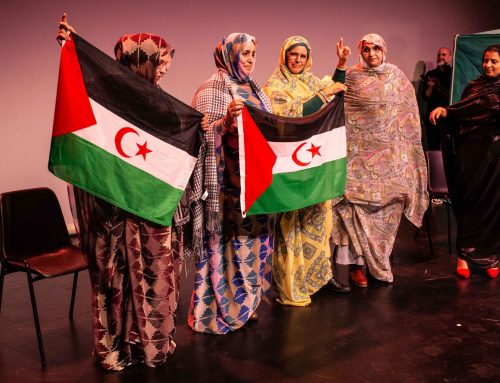As scores of film festivals around the world transition to online editions due to the coronavirus pandemic, the Western Sahara International Film Festival (FiSahara), one of the most remote events in the world, has decided to postpone its XVI edition, set for this coming month of October, and is working on an alternative model that “offers the Sahrawi refugee population a meaningful festival experience while preventing the community spread of COVID-19 in the Sahrawi refugee camps”, which are located near the Algerian city of Tindouf, according to its organizers. (upper photo by Giulio Paletta)
With the theme Breaking the Silence: Memory and Resistance, FiSahara’s 16th edition seeks to shatter the collective international silence surrounding the 45 year-old conflict in Western Sahara, and its organisers were set to announce several high profile guests right before the festival.
FiSahara was weeks away from holding its 2020 edition in mid-April in the Ausserd refugee camp when the COVID-19 crisis forced its team to suspend the event, including chartering a flight carrying dozens of filmmakers, human rights activists, media, international team and public to Tindouf to participate in the festival. The festival’s dates were tentatively changed to October, but the current situation has forced organisers to postpone once again.
With few resources to tend to COVID-19´s most serious cases, the pandemic represents a grave threat to Sahrawi refugees. As the world shut down in March, the Sahrawi refugee camps also self-isolated for months and have been successful so far at holding down the number of infections and controlling the spread of the coronavirus.
And while the festival is a lifeline to the community — offering much needed entertainment and drawing international attention to the plight of the refugees and Sahrawis under Moroccan occupation — hosting dozens, if not hundreds, of international visitors would open up the camps to infection. “This is not a risk that we can afford to take”, say FiSahara’s organizers.
The challenge is to come up with a festival model that has the capacity both to reach the refugees, who have little access to Internet and are unable to stream films, while at the same time engage and galvanise international media, activists, filmmakers and the public, an essential part of the festival’s mission to raise global awareness. A fully online festival, a model that many others have adopted around the world, is impossible because of technical limitations in the camps.
FiSahara is currently organised through a partnership between the Sahrawi Ministry of Culture in the refugee camps in coordination with the Polisario Front in Spain, and the NGO’s NomadsHRC and CEAS-Sáhara, both based in Spain.
In the camps, a spokesperson for the Ministry of Culture stated that “given the current health risks we have decided to postpone this edition, especially considering the current spread of the coronavirus in Spain, where the charter flight to the festival originates. We are working on a different model for the festival that we can hopefully implement this year with both local participation and international support”.
“As a people in perpetual resistance and struggle, Sahrawis are used to overcoming challenges; we adapt and move forward, and this makes us more resilient” stated Abdulah Arabi, Polisario Front representative in Spain who co-founded FiSahara in 2003. “Our aim is to organise an edition of FiSahara that has both a local impact and a global reach”.
María Carrión, Executive Director of FiSahara and co-founder of NomadsHRC, added that “now more than ever we must honour the festival’s theme; we must break the silence internationally on the Moroccan occupation of Western Sahara and Morocco’s human rights violations in the territory, the dramatic neglect suffered by Sahrawi refugees in the camps and the need for the UN to implement its long-promised referendum on self-determination”.
“This year it will be 45 years of occupation, and 10 years since tens of thousands of Sahrawis in the occupied territory erected the Gdeim Izik resistance camp to protest the conditions under occupation and demand their freedom, a cry that reverberated through the region and was the first revolt associated with the Arab Spring. Those of us at FiSahara are saying enough is enough”, concluded Carrión.
José Taboada, President of CEAS-Sáhara, added that “now the priority is to fight against COVID-19 in order to prevent its spread in the refugee camps. But we will continue to organise the next edition of FiSahara with more energy than ever, knowing that it will help the world to get to know this noble and brave people who resist and never give up, and who deserve all of our solidarity. FiSahara’s ultimate aim is to celebrate its future editions in a free Western Sahara”.
This summer FiSahara launched a children’s festival called FiSahara MINI, as part of the program “Vacations in Peace” that usually sends thousands of Sahrawi children to Spain for the summer holidays but this year, due to the pandemic, organised activities around sports, culture and entertainment for kids in the refugee camps. In July and August FiSahara offered mobile screenings in the camps and in the liberated Western Sahara with 24 animated shorts by film students from France, Croatia, Denmark, Canada and Belgium, loaned by Miyu Distribution.
FiSahara was created by and for the Sahrawi people, and cinema, a new art for the Sahrawi people, is now a part of Sahrawi culture. Sahrawi filmmakers who studied at the Abidin Kaid Saleh Audiovisual School are producing Sahrawi-made films that are screened in international festivals, and are now teaching at the film school. A group of these filmmakers has created audiovisual materials in widely distributed life-saving awareness campaigns by the Sahrawi Ministry of Health around the prevention of the spread of COVID-19 in the refugee camps.
This edition of FiSahara is supported by scores of organisations and funders, including Dimes Foundation, Bertha Foundation, Cultures of Resistance, AISGE Foundation and LUSH Charity Pot. Organisers state that “we are truly grateful to our funders and remain committed to using these resources to organise FiSahara’s many activities in meaningful and impactful ways that prevent community spread of COVID-19”.

